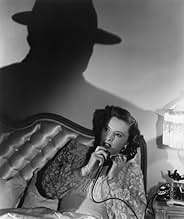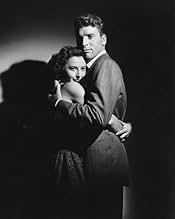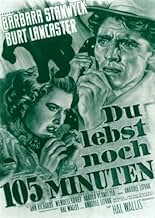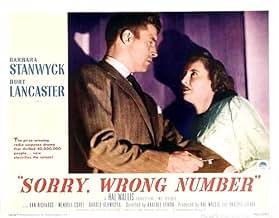अपनी भाषा में प्लॉट जोड़ेंWhen neurotic bedridden wife Leona Stevenson overhears a murder plot on her telephone, she tries to piece the puzzle together and prevent the murder. Based on Lucille Fletcher's famous radio... सभी पढ़ेंWhen neurotic bedridden wife Leona Stevenson overhears a murder plot on her telephone, she tries to piece the puzzle together and prevent the murder. Based on Lucille Fletcher's famous radio play.When neurotic bedridden wife Leona Stevenson overhears a murder plot on her telephone, she tries to piece the puzzle together and prevent the murder. Based on Lucille Fletcher's famous radio play.
- 1 ऑस्कर के लिए नामांकित
- 3 जीत और कुल 3 नामांकन
- Page Boy
- (बिना क्रेडिट के)
- Police Sergeant Duffy
- (बिना क्रेडिट के)
- Cotterell's Blonde Girlfriend
- (बिना क्रेडिट के)
- Clam Digger
- (बिना क्रेडिट के)
- French Maid
- (बिना क्रेडिट के)
- Cigarette Girl
- (बिना क्रेडिट के)
फ़ीचर्ड समीक्षाएं
Trivia note: The only other film with such heavy use of flashbacks to tell a complicated story is THE LOCKET ('47), but it was done more efficiently than it is here.
Apart from the flashbacks, which epitomise the film noir tropes of the late forties, this film is Barbara Stanwyck alone and scared and trapped in her trappings of wealth. She's confined in the physical and mental luxury jail cell she's made for herself. It's an exceptional performance of a woman in despair driven to the edge, of knowing something awful is about to happen but not being able to do anything about it. It's a perfect example of how a film can stretch out tension and suspense tighter and more intense with each passing minute.
And I also loved it when in one of the flashbacks, Fred shouts to his wife: Hey Sally, Joe wants a bottle of beer and she obligingly dashes out to the shop: oh how 1940s!
Sympathy builds for this unlikeable woman, Leona, played by Barbara Stanwyck. She is a spoiled heiress used to getting her own way, but as we come to see, very much created by her father (played by Ed Begley) who bows to all her wishes.
Her husband, Henry, played by Burt Lancaster, whom she chases and captures from her best friend, initially goes along with being an employee in her father's corporation but eventually starts chafing at the restraints imposed on him.
The movie just about plays in real time with the addition of many flashbacks, one of which secures the knowledge that there is nothing wrong with Leona, it is all psychosomatic based on her mother's fatal illness.
From the moment Leona accidentally overhears a plotted murder for later on that evening, the viewer is taken on a ride that builds suspense and tension to a terrifying conclusion and the movie's title.
Not to be missed. The cinematography is superb, a lot of play in light and shade. Barbara deserved an Oscar but lost. 8 out of 10.
The Irony is that Sorry, Wrong Number is far from her finest hour on screen. Rarely has one been made so aware of Stanwyck `acting' in the most unabashedly actressy way. And the same can be said of Burt Lancaster who, when a role didn't set well with him, communicated his discomfort blatantly. In The Rose Tattoo, against Anna Magnani, he was ingratiating and unconvincing ; here, he's almost as awkward as the henpecked husband in whom the worm has at long last turned.
But maybe Fletcher's slice of devil's food cake calls for mannered histrionics. Ensconced in her bedchamber one sweltering Manhattan evening, her pill bottles and her telephone at her elbow, Stanwyck eavesdrops on a sinister conversation a murder is being plotted thanks to a crossed line. This makes her even more restive, and she starts working the phone, tracking down her tardy husband. Litvak `ventilates' these calls, turning them into a series of flashbacks filling in the background to what will prove a very bad evening for Stanwyck. (The sequences on Staten Island, however, could have sprung from the pen of Franklin W. Dixon, the Hardy Boys' puppeteer.)
Unavoidably talky, owing to its source, Sorry, Wrong Number moves inexorably to its preordained end. Basically, it's a gimmick, and one that Hitchcock might have fine-tuned into a nifty infernal machine. Litvak doesn't do badly, though, and the movie's shock value outlasts its staled conventions. Its most chilling moment comes when Stanwyck frantically dials a number that she thinks will give her solace. But her answer is `BOwery 2-1000 the City Morgue.'
क्या आपको पता है
- ट्रिवियाAnatole Litvak: Where Henry is having lunch with Sally, he asks his waiter if he knows who the gentleman is in the dark glasses at the table behind him. It is the director.
- गूफ़Twice, Leona turns on a radio, and music begins instantly and strongly. Radios of the film's era contained vacuum tubes that needed some time to warm up.
However, this would be filmmaker's prerogative, not wanting to slow the pace of the film with extended silence.
- भाव
Henry Stevenson: [to Leona] I want you to do something. I want you to get yourself out of the bed, and get over to the window and scream as loud as you can. Otherwise you only have another three minutes to live.
- क्रेज़ी क्रेडिटPROLOGUE: "In the tangled networks of a great city, the telephone is the unseen link between a million lives...It is the servant of our common needs-the confidante of our inmost secrets...life and happiness wait upon its ring...and horror...and loneliness...and...death!!!"
- कनेक्शनEdited into Dead Men Don't Wear Plaid (1982)
टॉप पसंद
- How long is Sorry, Wrong Number?Alexa द्वारा संचालित
- What is the name of a popular song that is played on a portable record player in the scene in which Barbara Stanwyck's character, Leona, argues with her friend Sally Hunt about Henry Stevenson?
- Is 'Sorry, Wrong Number' based on a book?
- What is 'Sorry, Wrong Number' about?
विवरण
- रिलीज़ की तारीख़
- कंट्री ऑफ़ ओरिजिन
- भाषा
- इस रूप में भी जाना जाता है
- Al filo de la noche
- फ़िल्माने की जगहें
- हॉलीवुड, कैलिफोर्निया, संयुक्त राज्य अमेरिका(telephone switchboard at a telephone company office on Gower St.)
- उत्पादन कंपनी
- IMDbPro पर और कंपनी क्रेडिट देखें
बॉक्स ऑफ़िस
- दुनिया भर में सकल
- $1,974
- चलने की अवधि1 घंटा 29 मिनट
- रंग
- पक्ष अनुपात
- 1.37 : 1
इस पेज में योगदान दें


























